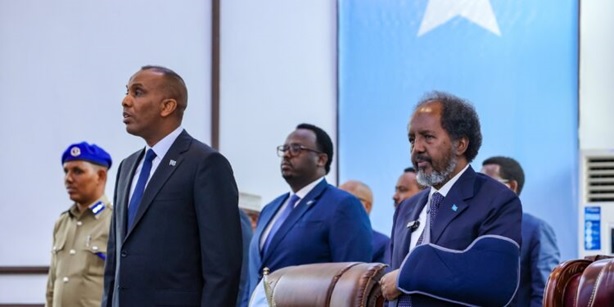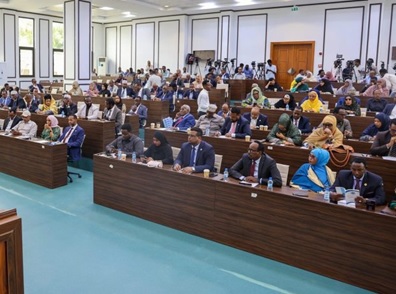By Ahmed A Muhumud
Somalia’s two houses of parliament is reconvening for their sessions with a busy agenda ahead. One of the more contentious items in front of them is to pass major controversial amendments of the Provisional Constitution as agreed upon by members of the National Consultative Council (NCC) on May 28, 2023.

The NCC proposed amendments to the federal constitution, that include limiting the political parties to two and transitioning from a President-Prime Minister system to a President-Vice President model. The parliament should wholly reject this ill-advised and ill-timed power-grab based on the following grounds:
1) A major overhaul of the Provisional Constitution:
A major overhaul of the Provisional Constitution needs to be broad-based and inclusive. It also needs to have strong legal foundation. This proposal has neither. The National Consultative Council (NCC) is an ad-hoc body without any constitutional basis and exists primarily as a forum to forge a working agenda on key national issues, mainly around security. It is not a rule-making body and it certainly shouldn’t be the source of redrawing the entire political arrangement that revived Somalia’s nascent government institutions after the state collapse in 1991.
Furthermore, the NCC’s proposal is rife with self dealing and grants illegal term extensions to all regional leaders while thwarting key power sharing agreement at a time when there’s a massive trust deficit and leaders both at the national and regional levels show very little regard to the supremacy of law. Case in point is the abolishment of the PM position in favor of ceremonial vice president and an endorsement of the presidential system, a departure from the current parliamentary system.
The Somali state collapsed in 1991 precisely because of powerful president accountable to no one and remained stateless until the current model was adopted in 2000. While the current arrangement leaves much to be desired and could certainly use improvement, this proposal lacks thoughtful, inclusive and broad-based buy-in and was essentially a deal reached by a handful of men all interested furthering their personal and political ambition. Genuine reconciliation and building confidence among all stakeholders should be a pre-requisite to major overhaul of government structure such as the one proposed here. This is also antithesis to President Hassan Sh. Mohamoud pledge during his campaign and his famous slogan (“Soomaali Heshiis ah, Dunidana Heshiis la ah”).
2. Constitutional mandate limiting national political parties:
Somalia was notorious in the number of political parties during the civilian and democratically elected governments between 960 to 1969. The number skyrocketed to over sixty so-called political parties in the last election held in 1967. So, while it’s desirable to limit the number of political parties to avoid the repeat of that era, it’s nonetheless absurd to swing the pendulum on the other extreme and essentially codify a two-party system.
Some supporters of this plan, wrongly argue, that much larger democracies like the United States, have two parties. What they ignore, or perhaps don’t know, is that while two major political parties dominate US elections, it’s not illegal to register new political parties and in fact smaller parties have played an outsize role in recent US elections such as former Green Party leader Ralph Nader who garnered nearly 3% of the vote in 2000 essentially denying former VP Al Gore an easy victory.
It’s also absurd that this proposal calls for a presidential system at the same time it proposes limits on the number of political parties to two. The issue that this proposal is allegedly trying to solve is rampant in a parliament system where any individual with reasonable name recognition and political base could register a political party and win a seat. That problem is a less of an issue in a presidential system where any serious candidate would require national appeal, significant capital and cross-sector support among all corners of the country. Therefore, the reality will limit the number of serious political parties without the need to codify a two-party system.
3. Illegal extension of regional leaders doesn’t help anyone but those already in office:
President HSM famously rejected his predecessor’s attempt to illegally extend his term in office and rightly so. He’s also on the record rejecting Puntland President Dani’s attempt to extend, albeit briefly, his term in office. It’s therefore mindboggling that he would agree to extend other regional/federal member state’s term. Actually, it isn’t that mindboggling if you think of it!
The president is well informed in his craft and understood that he needs to give something in exchange of his power grab and desire to eliminate the prime minister position which he views as burdensome and undue influence on his authority. Therefore, he orchestrated this scheme to extend the terms of regional presidents much to the dismay of many of their opposition. Unfortunately, this is shortsighted and dangerous precedent. Those who illegally seek to extend their time in office are likely to repeat and make others follow-suit.
The irony of term extensions is these leaders could easily garner enough support to secure their re-election if they actually had a good record to run on but they often don’t and therefore only try to stay as long as possible so they can enrich themselves and their associates. These points notwithstanding, regional leaders can and should address their desires for term extensions at the right forum…..regional representatives and the national assembly should stay away from endorsing a matter so controversial and beyond their purview.
4. Single election
One of the arguments advanced by the NCC is that holding single elections will streamline the election process and safe cost. What they fail to mention is the strong likelihood that this will have the unintended consequence of nationalizing local elections essentially rendering them meaningless. They will be overshadowed by the federal elections and their much better financed candidates and name recognitions.
To the contrary, it is important that local and regional elections are organized, financed and managed locally at a time and place of their choosing. It is also important to untie the fait of local candidates from the national leaders. Federal member states leaders whose term in office doesn’t coincide with the sitting president have a much better chance of honestly and fairly exercising their authority and the interest of their public than one who’s essentially running on the same ticket (or opposite) the sitting president. Somalia needs to desensitize political patronage and corruption not encourage it. And finally, I happen to think that four-year term for local leaders is already too long. Making it five years isn’t necessary.
Conclusion:
Rushing this controversial policy isn’t just unconstitutional, it is also a bad politics! President Hassan Sheikh Mohamoud is enjoying a period of unbelievable political stability with a loyal prime minister and virtually no opposition in Mogadishu. He also has the entire public behind his war against Al-Shabab. The last thing he should do is engage in political squabbling and divert attention from national priorities like ridding the menace of Al-Shabab from the country.
It is also worth mentioning that NCC’s decision came on the heels of a successful local elections in Puntland in which both the President and his Prime Minister publicly opposed and warned against because of the likelihood of destabilizing the region. This proposal has the potential to cause far greater instability and introduce a period of uncertainly than local Puntland elections would ever have on the national scale.
Finally, the government is behind in most of their own timeline for implementing this successfully. Nearly six months have gone since this was announced and not much progress was made and we’re a mere seven months from the end of June 2024 when local elections where slated. This was the one non-controversial item on the proposal and not much has happened! All of this has the hallmark of a half-baked disingenuous process that will divert the nation’s attention from fighting Al-Shabab, question the priority of national leaders and give illegal term extension to regional leaders without the consent of their constituents. The Parliament will be wiser to reject it and return this back to NCC.
Ahmed A Muhumud
Email: axmedabdi@gmail.com


Leave a Reply